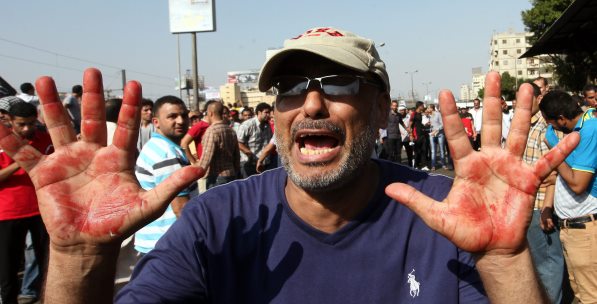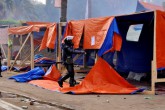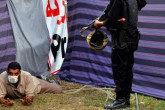Interpreting the Modern Egypt by means of two symbols of power, streets and palaces, may seem as an act of simplifying events; however, it will pave the way for us to see the very essence of the matter. Two leading political actors of Egypt, the military and the Muslim Brotherhood (Ikwan) have deepened their power and gained legitimacy with the help of these symbols. Since Gamal Nasser’s rule, the military has controlled palaces while the Brotherhood, who was alienated from political spheres, has dominated streets. The January 25 Revolution cleared the way for democracy and launched a period during which people in the streets dominate, or are able to dominate, palaces for the first time in the Egyptian history. Notwithstanding, the military coup d’état, which took place on July 3, 2013, put an end to this period and indicated the desire of the military to retake the control of streets and palaces with foreign support through bloody means.
The primary dynamic of the January 25 process is that the Egyptian people, who have passed the fear threshold, will not easily give up the streets. For that very reason, dignified resistance of the Ikhwan and democracy supporters on the streets despite Ramadan, month of fasting, and hot weather, not only showed the military that nothing will be the same but also caused military regime, which became helpless against this resistance, to lose its composure. The August 14 massacre in Egypt proved the helplessness of coup supporters and indicated that the military, which fails to compete against the resistance of the masses through political means, returned back to old methods.
THE LEGACY OF THE COUP AND MASSACRE
It is necessary to analyze Egypt, which witnessed one of the bloodiest days of its history this week, from this perspective. This massacre, which cost more than two thousand people’s lives, requires us to refocus on the key country of the Arab Spring. First of all, the atmosphere for a democratic transformation no longer exists in Egypt. Or it has become meaningless. Today Egyptian politics no longer relies on democracy and the rule of law. Today Egyptian politics is on a power-centered axis. This yields not only political but also social reverberations. That coup supporters resorted to violence in order to end the resistance and to gain strength deepened the social polarization between democracy supporters and coup supporters. This not only hinders the resolution of the problems in the country but also seriously harms social peace.
Second of all, the current process launched by the July 3 coup and sustained by the massacre, declared the death of “value” centered international society. Now, it is clear that the championship of democracy assumed by the Western countries, their references to human rights and the values they propagandize lose meaning when it comes to the Middle Eastern and Islamist actors. The West does not even feel the need to hide that it interprets the developments from a “power” and interest-oriented perspective. This, indeed, indicates a serious loss of essence in the 21st century during which we believe that democratic values and human rights prevail.
If the international community had adopted a value-oriented attitude against the developments, it would have prevented the massacres that cost many people’s lives. Biased attitude of the West at the beginning of the coup weakened its subsequent efforts of mediation. Unfortunately, the West’s efforts of mediation did not include a resolution to the deepening crisis. The West, instead, tried to make the Muslim Brotherhood accept the coup and to pursue the process as if nothing has happened. Therefore, international society and the West deepened the crisis since the beginning and paved the way for this massacre in a sense. The West may seem to be a cog in the wheel however; it strengthened the coup supporters’ hand when it did not take a position that would influence the nature, format and content of the events.</



